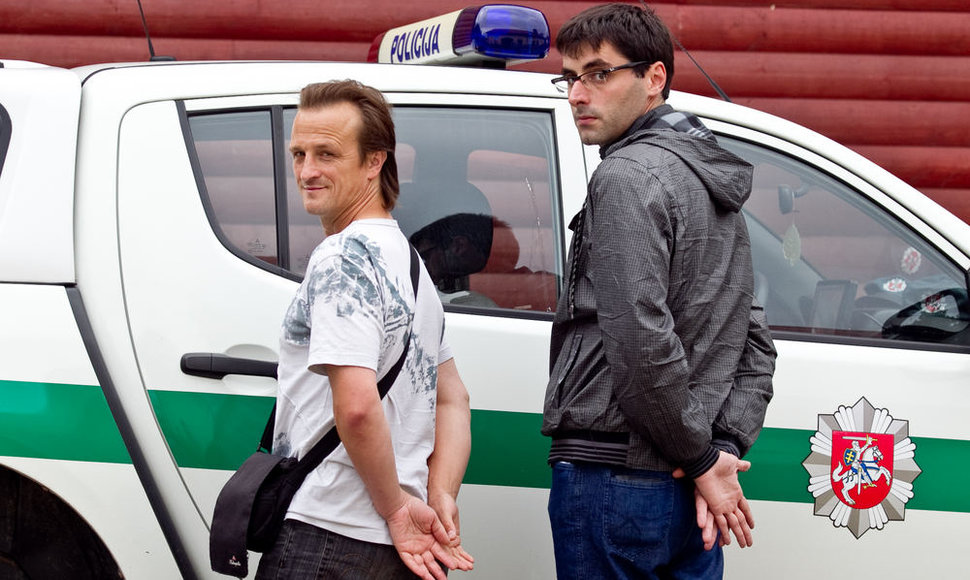Officers claim they did everything by the book and it was the Georgian who was throwing insults at them, while lawyers comment that such actions by its law enforcement should make Lithuania ashamed.
“There are many cases where testimonies of usually two police officers outweigh that of alleged offender, so fighting injustice might be very difficult for an accused citizen, let alone a foreigner,” says Gitana Šimkutė, lawyer whose firm agreed to help Mr Gardava in court.
Eventful trip to work
One could be excused for doubting Mr Gardava's incredible story, if it weren't for many facts testifying to his credibility: status as a social worker and volunteer, career as a municipal employee in Georgia, master degree from Tbilisi University, and, finally, sincere look of amazement at ending up in a police station for “resisting orders from police officers and insulting them.”
“Just like every morning, I was taking a train to my work in Vievis Children's Day Centre. Unfortunately, I decided to inquire police officers who were passing by about which platform my train was leaving from. They said they didn't know and were about to climb down the steps, when they suddenly turned back and asked to see my ID,” the man recounts.
Mr Gardava did not have his passport on him and his attempts to convince the policemen he was living and working in Lithuania legally fell on deaf ears: “They were speaking Russian, swearing and saying insults, they said they were familiar with people like me.”
Giorgi showed them his European Volunteer Card, also a Georgian document certifying that he is a legal weapon owner, bearing his name, photo, identification number, and all regalia of the Georgian state.
After an extended quarrel, several phone calls, and repeated checks, the officers returned his documents and said he was free to go, since he did indeed live and work in Lithuania legally. Unfortunately, the train to Vievis had long been gone and Giorgi missed an important meeting in the Children's Day Centre.
And this is where the desperate Georgian made his second “mistake.” He said he would not leave it like this and demanded a written letter to his employers explaining why he missed work.
The demand made the policemen suddenly change their minds, they took back Mr Gardava's documents and, arresting him for insults against police officers, took him to Vilnius 3rd police station. An hour passed waiting for help from the Georgian Embassy, a breath test, filing documents, going from door to door, and even an accompanied trip home to collect his passport.
In the end, the police filled an administrative offence report and the Georgian was presented with a summons to court. “I'd have never believed such things were possible in Lithuania,” says Mr Gardava, confused and upset.
Police reply
Ramūnas Šilobritas, chief of Vilnius 3rd police station, when confronted with a question from 15min about actions of the two police officers in the train station, sent an official reply. In it, he claims that documents of a Georgian national were checked by State Border Control officers, while police patrolmen only came to help their colleagues.
“During the inspection, Giorgi Gardava was insulting patrol officers and was therefore taken to the police station where a report of administrative offence was filed. There is no evidence in our possession that the officers were communicating to Mr Gardava in an inappropriate or offensive manner or otherwise breached professional ethics,” reads the reply.
Fear of Georgian illegals
The conflict between the policemen and the Georgian will be taken up in court. However, the police officers did indeed have a right to inspect the Caucasian-looking man. Over the last several years, an increasing number of illegal immigrants come to Lithuania from Georgia, therefore the police and other law enforcement services pay increasing attention to black-haired and dark-eyed individuals coming from the Caucasus. Especially in locations like railway and coach stations.
Experienced travellers know this well: if you see a police officer, you'd better stay away to avoid unnecessary trouble.
“We have been observing an increase in illegal migration to Lithuania, therefore officers pay particular attention to that,” Mr Šilobritas confirms.
Giedrius Mišutis, spokesman for the State Border Control Services, explains why stations are where officers are particularly alert. Illegals from Georgia, he says, cross Lithuania on their way further West.
“Most Georgians busted illegally crossing the Belorussian-Lithuanian border, claim they came to the country in search for a better life, yet at first opportunity try to run further to the West,” Mr Miškutis says.
Ms Šimkutė, lawyer, also confirms that numbers of detained illegals have boomed in recent years. “I an involved in one project where we help foreign nationals who have come to Lithuania illegally to defend their cases in court. I can confirm that there is a great deal of these foreigners,” she says.
Challenges in court
With help from lawyers, Mr Gardava sees hope in finding justice. The court has already been adjourned to give time to collect extra evidence. “Footage from security cameras in the train station is kept for up to three months, so we're putting much hope in it. Besides, we're calling the police officers involved in the incident to testify in court,” Ms Šimkutė says.
The firm of Gintaras Petukauskas and Gitana Šimkutė has agreed to help the Georgian national out in court pro bono. “Since foreign nationals are not guaranteed legal counselling in Lithuania, the state does not pay for an attorney in civil and administrative cases, there are many other obstacles, making it very difficult for a wrongly accused foreign citizen to defend him or herself,” Ms Šimkutė notes.
According to her, Lithuania is no different from many other countries. “The same happens in many places. Experienced travellers know this well: if you see a police officer, you'd better stay away to avoid unnecessary trouble.”
The lawyer admits she feels shame for the actions of the officers who patrolled in Vilnius Train Station: “From a human perspectives, after inspecting a document bearing a photo and an identification number, the officers should have immediately released the Georgian to catch his train.”
Not the first time
Kęstutis Dringelis, who runs Vievis Children's Day Centre and supervises Giorgi's duties, says he was surprised when the volunteer failed to show up at work, yet after hearing his version of the unpleasant story, he had no doubt about its accuracy whatsoever. He says he had an unpleasant incident in that very police station a year ago.
He was himself arrested because while waiting for a night train to Vievis, he made himself an alcoholic cocktail in a public place. An security officer immediately approached him and, a little later, policemen took the social worker to Vilnius 3rd police station.
“I realized I had committed a folly, I admitted my guilt. I only wanted the officers to write me a ticket as soon as possible so I could catch the last coach home. Otherwise, I would have needed to sleep on a bench. However, they kept me in the police station for several hours, without giving any explanation, until I started walking from door to door myself and look for justice. Eventually, they released me in the station district, well after midnight, and even without a fine ticket. This upset me even more than the arrest itself,” Mr Dringelis recalls.
Trial in absentia
Mr Gardava is facing a 500-litas fine, yet the Georgian will not even be able to attend the next hearing scheduled for August: “My volunteering contract and residence permit expire, so I will be going home. Unfortunate, as I won't get the chance to prove my case in front of the court myself.”
The law firm appointed a representative for him and his colleague, Mr Dringelis, promises to attend the hearing. He will try to prove that the policemen overstepped their commission, while the volunteer from Georgia is innocent and merely chanced to be in the wrong place at the wrong moment.













